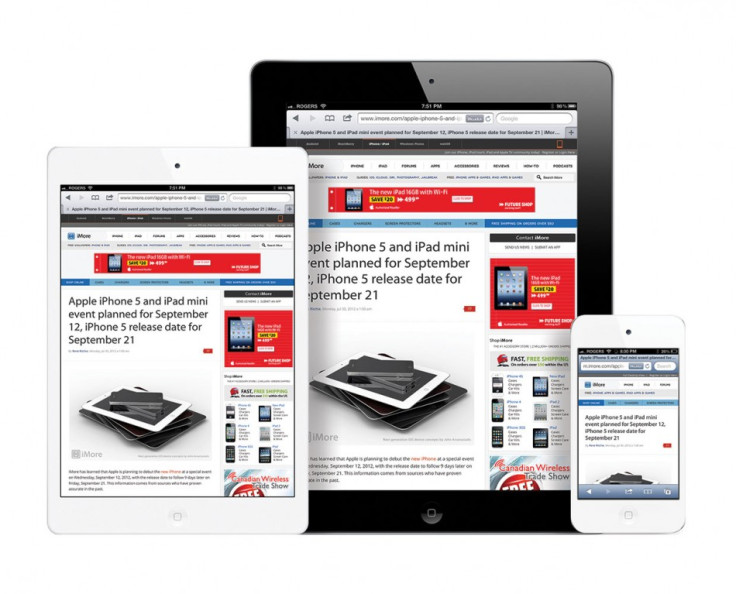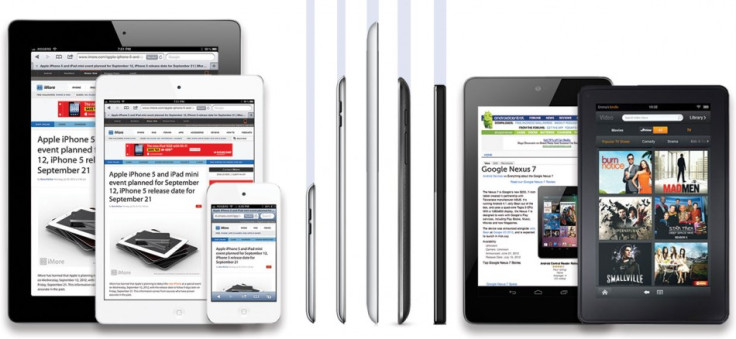Apple iPad Mini - What to Expect
We all know that Apple is preparing to launch a new iPhone - not the iPhone 5 - but less has been said about the other iOS device thought to be in the works - the iPad mini.

Rumours that Apple will announce a smaller iPad to fit somewhere between the iPod touch and its flagship tablet first surfaced more than a year ago, but all went quiet until recent launches of slimmed-down tablets from rivals spurred the rumour mills back into life.
Amazon and Google have both shown that consumer demand for smaller tablets is high with the Kindle Fire and Nexus 7, so it's no coincidence that within a week of Google launching its tablet, Bloomberg and the Wall Street Journal both reported on claims that Apple would soon join the mini tablet market.
Renowned technology blogger John Gruber has shown his cards and suggested that Apple itself leaked the Bloomberg and WSJ stories to appear right after Google started to make its move with the Nexus 7.
"If you think these stories appearing within a day of each other in the two most-respected business publications in the US - at the same time the Nexus 7 reviews began appearing and the device started shipping to customers - is merely coincidental and not a strategic competitive leak from Apple PR, then I would like to invite you to play in my poker game," Gruber said.
Aside from a scattering of rear panels and a plethora of Photoshop mockups, we've yet to see much of the iPad mini - compared to the new iPhone, which has given away its screen, case, dock connector and most of its internals weeks before the expected announcement.
Gruber believes this is because the two products won't go on sale at the same time. Remember, when the original iPhone was announced back in 2007 Apple chose to show it before Chinese manufacturers could spoil the surprise, so we'd expect a smaller iPad to get the same treatment.
An announcement alongside the new iPhone in September, but with a release date several weeks later, is what Gruber expects and we'd be inclined to agree.
What will it look like?
As two mockups this week from 9to5Mac and iMore show, the iPad mini could have a 7.85in screen - a number that has floated around for some time, and one that everyone seems happy to agree with.
Gruber takes this a step further and explains that with a 7.85in display with a resolution of 1024 x 768 - same as the iPad 2- a pixel density of 163 pixels per inch and an aspect ratio of 4:3, the iPad mini will display tablet-specific iOS apps in exactly the same way as the iPad 1 and 2, just a bit smaller.
A pixel density of 163ppi is some way behind the Retina screens of the iPad 3 (264ppi) and the iPhone 4S (326ppi), but this means Apple already has the door open for a Retina update and an iPad mini 2 a year later.
As for design beyond just the display, most mockups so far point towards a device that is exactly like an iPad, just shrunk down equally in every direction.
Gruber doubts this will happen, and believes that Apple will instead give the iPad mini its own identity, citing that the iPhone and iPad aren't merely the same device scaled differently.
The iPhone has much less space to the left and right of its screen, compared to the iPad with its larger bezel acting as somewhere to rest your thumbs, while the sides and rear of each device could hardly be more different - same goes for the iPod touch.
Thinner iPad
Seth Weintraub of 9to5Mac, Rene Ritchie of iMore and Gruber have all said this week that the iPad mini will be substantially thinner than the full-size iPad, and even as thin as the 7.2mm iPod touch.

This would make the smaller iPad significantly lighter and easier to hold in one hand, and for long periods of time - while reading, for example - but the screen would still be large enough to offer full-size web pages and every app from the AppStore exactly as they appear on the non-Retina iPad 2.
All three believe the iPad mini will have a thinner screen bezel relative to the size of the screen itself - around half way between the iPhone and full-size iPad, giving you somewhere to rest your thumb, but making the device as compact as possible without sacrificing screen size.
As Ritchie said: "This is a full on iPad, just smaller and lighter."
Gruber takes things even further, addressing the predicted weight of an iPad mini - a figure that he puts at 265g, significantly less than the 652g regular-size iPad and only slightly heavier than the 247g Amazon Kindle Keyboard.
Getting the weight below 300g would be a remarkable achievement and have much to do with not including a Retina display. When the full-sized iPad got the Retina treatment, the battery was made much larger to help power the addition two million pixels, and as a result the newest iPad is almost too heavy to be held comfortably.
Another advantage of sidelining the Retina display for a year or so is the price. All signs are pointing towards the iPad mini costing between $200 (£123) and $250 to compete with the £159 Google Nexus 7.
Add some VAT and 'Apple Tax' to that $200 price and we'd expect to see the iPad mini start at around £180 - £200, or half that of the cheapest full-size iPad.
This price puts the mini dangerously close to the iPod touch, which retails for between £169 and £329, so we would expect to see either a price cut for the touch or a shift in sales towards the iPad mini.
Discontinue
Apple may even discontinue the 16GB touch, instead marketing the larger 32GB and 64GB models - and maybe a new 128GB - as dedicated media players to store your entire music collection on, rather than a device for reading and creating, like the iPad mini.
Add all of these aspects together, and Apple could be onto a winner, as Gruber concludes:
"Throw in cellular networking (which the Nexus doesn't have), a rear-facing camera (which the Nexus doesn't have), a competitive starting price on the entry-level Wi-Fi-only model, the App Store's superior software selection, and worldwide availability (the Nexus 7 is available only in the US, Canada, Australia, and the United Kingdom so far), and yeah, I'd say the prospects look OK for Apple in the small tablet market."
© Copyright IBTimes 2025. All rights reserved.






















